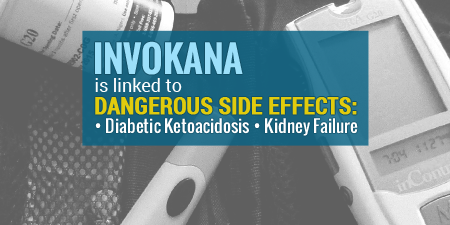Health Canada Announces Invokana Safety Investigation

SHARE
FULL STORY
SHARE
San Diego, CA (Law Firm Newswire) July 21, 2015 – Officials representing Health Canada, the department of the government of Canada responsible for national public health, announced recently that the agency would be investigating the safety of Invokana and similar medications, due to concerns that the Type 2 diabetes drugs may increase the risk of patients suffering ketoacidosis side effects.
The Health Canada announcement comes on the heels of a May 2015 safety communication issued by the U.S. Food and Drug Administration (FDA), which warned of a possible connection between sodium-glucose cotransporter-2 (SGLT2) medications and diabetic ketoacidosis. For those that feel they have been harmed by side effects of Invokana or another SGLT2 inhibitor drug, contact a knowledgeable product liability lawyer today for legal help.
Alleged Side Effects of Popular Diabetes Drugs
Diabetic ketoacidosis (DKA) is a serious medical condition in which the pH balance in the blood becomes too acidic, resulting in complications like dehydration, coma and possibly even death in some cases. In addition to DKA, SGLT2 inhibitors like Invokana have also been linked to a potential increased risk for kidney damage, kidney failure, dehydration, and other injuries possibly linked to the action of the drugs on the kidneys. The Type 2 diabetes medications function by preventing the kidneys from reabsorbing glucose, causing some of the glucose to be removed through the urine, which may expose the kidneys to serious harm.
FDA Warning for Users of SGLT2 Inhibitors
According to a drug safety communication issued by the FDA on May 15, 2015, popular Type 2 diabetes drugs like “canagliflozin [Invokana], dapagliflozin [Farxiga], and empagliflozin [Jardiance] may lead to ketoacidosis, a serious condition where the body produces high levels of blood acids called ketones that may require hospitalization.” The FDA issued this warning to consumers and the medical community after it identified at least 20 reports of patients with Type 2 diabetes taking SGLT2 inhibitors being hospitalized for diabetic ketoacidosis, ketoacidosis or acidosis side effects, from March 2013 to June 6, 2014.
Health Canada SGLT2 Side Effect Reports
The FDA indicated in its drug safety communication that the ketoacidosis reports were abnormal, as the condition typically develops in patients with Type 1 diabetes, low insulin levels and high blood sugar. In these particular adverse event reports, the patients had Type 2 diabetes and only slightly elevated blood sugar levels, but still developed diabetic ketoacidosis side effects. In its own SGLT2 inhibitor warning, Health Canada stated that while DKA is usually diagnosed in people with Type 1 diabetes, the agency had received “international reports of ketoacidosis with the use of SGLT2 inhibitors in patients with type 2 diabetes.” The agency also warned that, because DKA complications in Type 2 diabetes patients is “unexpected,” it may not be quickly identified or treated by doctors.
An Experienced Drug Injury Lawyer Can Help
After reviewing its own adverse event database, Health Canada identified in its warning one case of diabetic ketoacidosis resulting in hospitalization, which involved a 56-year-old patient taking an SGLT2 inhibitor, and stated that the agency will “determine whether changes are needed in the prescribing information for this class of drugs.” For those who have taken an SGLT2 inhibitor like Invokana in the past, and have since suffered diabetic ketoacidosis or another serious side effect, contact a reputable drug injury attorney today to discuss what legal options are available. There may be grounds to file a product liability lawsuit against the drug manufacturing company, in order to pursue financial compensation for injuries, medical expenses, and pain and suffering.
Learn more about Invokana related Lawsuits at http://invokana.attorney/
This article was originally published at http://invokana.attorney/health-canada-announces-invokana-safety-investigation/

